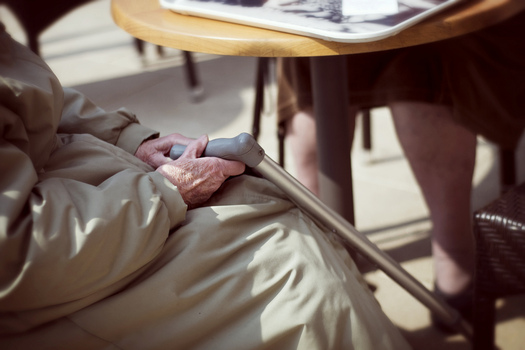
Photo by this is markb on Flickr.
When War was declared on Terror, a Security Industrial Complex (SIC) boomed. For the purveyors of full-body scanners, high-end police trucks, and Total Information Domination software, Terror has been good business. But is the world is a safer place? The SIC and this writer are aligned on the question: No, it is not.
The proclamation of a war on dementia — at yesterday’s G8 Dementia Summit in London — promises similar divergence between language and effect. We need to help policy shift its focus from the false promise of imminent cure for dementia, to the practical support of care ecologies that already exist.
During yesterday’s summit I was visiting with two elderly people in England. One of them suffers from acute short-term memory loss; the other has severe mobility impairment. During the day: a carer came to help one of them get up; a second carer came to check on his progress at mid-day; a physiotherapist came to do getting-up-the-stairs training; a district nurse (accompanied by a student) came to do a blood test; a pharmacist came to deliver a multi-compartment box pre-loaded with a week’s worth of pills; a team leader from the care company came to check how things were going; a man from Mobility Supplies delivered a Perching Stool for the bathroom; a gardener came to rake the leaves; a man came to fix the computer; a neighbour came from upstairs to say hello; and another carer came to help put the mobility-impaired man to bed.
Apart from the gardner, the computer guy, and the neighbour, all these caring professionals were being paid for — directly or indirectly — by the British state. Therefore, as I followed #G8Dementia on the interweb, I felt sympathy for the politicians and global dementiacrats assembled in London. Care at the level I witnessed in England — to which hundreds of millions of voting G8 citizens feel they are entitled, either now or soon — is not financially supportable. Hence the dementia summit: Something Must be Done.
That Something is not a war — but the airwaves resounded yesterday with words like ‘fightback’, ‘crisis’, ‘killer’, ‘timebomb’, ‘victims’, and ‘battle’. As many dementia sufferers and their carers have attested, the language of war in medicine makes things worse for them on the ground. It worsens the the stigma attached to the condition and increases fear in the broader population.
The net effect of war-speak is to diminish social solidarity.
Such language also demeans millions of sufferers and carers: Depicting people as helpless victims — refugees from a lost battle — disrespects and undervalues the often admirable lives led by an infinitely diverse group of people.
A lot of yesterday’s media coverage of the dementia summit was plain lazy. Some of it was pitiful: On the BBC, a reporter delivered his piece whilst standing beside a million euro brain scanner. He acted like a salesman for Siemens. Cutaway shots in his piece featured glowing on-screen images of peoples’ brains. This visual language amplified the myth that dementia is an alien presence that, given fancy enough technology, can be cut out. Other reporters used words such as ‘cruel disease’, ‘robs you of your mind’, or ‘horrific’. No report, that I saw, explained calmly that the word dementia covers more than 100 associated but different end-of-life conditions in which brain cells die on a huge scale for reasons….well, nobody really knows.
The G8 summit’s communique made much of the fact that millions will now be spent in a race to identify a cure or a ‘disease-modifying therapy’ for dementia. Although this announcement was not unexpected, it confirmed the fears of many that dementia resources, mobilised in an atmosphere of war and crisis, would be misallocated to Big Research rather than P2P care.
Yes, policy makers are stuck between a rock and a hard place — but they will surely live to regret their creation of a Dementia Industrial Complex. Its first tangible product, after all, is likely to be the mass production of un-met expectations.
“A cure for dementia could be just seven years away due to ‘incredible advances’ in medicine, says Health Secretary”. Hints like this of an an imminent cure for Alzheimer’s are misleading and irresponsible when made by journalists, or Big Pharma lobbyists. Coming from a government minister, they are downright cruel. As Dr Margaret Chan, Director General of the World Health Organization, said yesterday: ‘In terms of a cure for dementia, or even treatments that can modify the disorder or slow its progression, we are empty-handed”. So-called memory-boosting drugs, for example, have been found to have very modest effects. There is no evidence in humans that they slow the rate of progression.
Another consequence of mass screening will a cohort of distressed and therefore disgruntled voters: the significant numbers of people who will be told they have dementia, when they do not. Dementia tests are not especially accurate, and yet a misdiagnosis will be devastating when the misdiagnosed know full well that we can’t do much about the condition.
Care before cure
As I experienced this week in England, caring for cognitively impaired people, and for older people generally, is time and resource-intensive. No society can afford to pay indefinitely for the ‘delivery’ of such costly services to an ageing population within the framework of a bio-medical delivery system. This is another reason why ‘innovation’ will not resolve the dilemma — or only as a support: These are social needs. Perhaps ‘delivery’ and ‘pay for’ are the wrong words. The one sure way to improve life for people living with dementia is to ask them: What practical steps might improve your lives? With that to-do list as our guide, the social innovation task becomes: By what means can we — collectively and affordably as a society — co-create those measures?
Most of this to-do list is already known. During Alzheimer 100: the Journey through Dementia in 2007, for example, six issues were identified as being of particular importance to people with dementia and their carers:
First experiences (including listening to families; the training nurses and family doctors);
Early stages (including exercise, nutrition, mental stimulation; what to do at known trigger points — such as falls, or bereavement);
Stigmatization (the need to find spokespersons and advocates; elements of an awareness-raising campaign; training for the media);
Enabling and assisitive technology (the need to put people with Azheimer’s at the centre of the development process; assistive technology combined with people-based services; of the sample we talked with, tech was a priority for 18 percent);
End-of-life (including issues to do with care homes; palliative care; family support; end-of-life directives; support for carers before and after death).
Around the world, many hundreds of projects answer some of the needs articulated above. Most of these actions are small, local, and below-the-radar; but they have the enormous advantage that — unlike a cure for dementia — they are up-and-running. In several Nordic countries, for example, a scheme known as ‘Green Care’ enables people with dementia who live in their homes to spend time on farms where they interact with animals, plants — and children. (Green Care farms are used by kindergartens and other school projects as well as by people with dementia).
A care economy is best imagined as the support and stewardship of a care ecosystem that already exists. The beauty of the health-as-ecosystem idea is that it enables us to focus on the existing metabolic energy of people. It builds, further, on the trust between people, built up by co-presence over time, that is judged by dementia patients and their carers — at least in Britain — to be twice as important as the delivery of services by third party vendors.
Ninety five percent of dementia of care happens outside the biomedical system — among, for example, the three million British people who were caring for people with dementia before yesterday’s summit convened. If the world’s governments want to throw money at dementia, great — but they should do so on the basis: 95 percent for socially co-created care — and five percent for Big Research.

